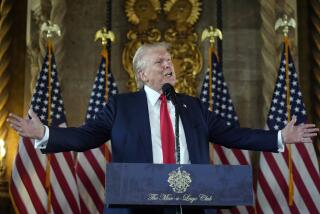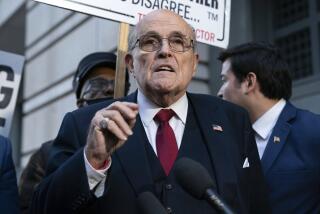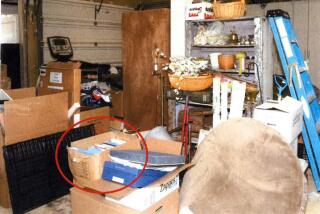Deaver Indicted for Perjury as Rehnquist Blocks Plea : Grand Jury Acts Hours After Ruling
- Share via
WASHINGTON — Former White House aide Michael K. Deaver was indicted today by a federal grand jury on five counts of perjury for allegedly lying to Congress and a federal grand jury about his private lobbying activities.
Special prosecutor Whitney North Seymour convened the grand jury hours after Chief Justice William Rehnquist denied Deaver’s bid for an emergency stay of the proceedings. Rehnquist said Deaver had not convinced him the ethics law under which independent counsels are appointed was unconstitutional.
The Supreme Court ruling removed the last legal hurdle preventing Seymour from proceeding against Deaver.
Randall Turk, one of Deaver’s attorneys, had indicated they were bracing for a quick indictment.
4 Perjury Counts
Seymour had said he would ask the grand jury to indict Deaver on at least four counts of perjury stemming from his testimony before a congressional panel and the grand jury.
Deaver becomes the first high-ranking official charged with criminal wrongdoing under the 1978 Ethics in Government Act, passed to curb the abuses of the Watergate scandal.
At least eight special prosecutors have been appointed under the law, four of whom have cleared top Administration officials of wrongdoing, including Atty. Gen. Edwin Meese III while a top White House aide and former Labor Secretary Raymond Donovan.
Among other things, Seymour’s yearlong probe focused on Deaver’s work as a $105,000-a-year lobbyist for Canada on the controversial acid rain issue; his $250,000-a-year contract with Rockwell International to promote government purchases of the B-1 bomber, and his efforts on behalf of a New York brokerage firm to retain tax credits for U.S. business in Puerto Rico.
50,000 Documents
Seymour, appointed May 29, 1986, said he questioned more than 110 witnesses before a grand jury and examined more than 50,000 pages of subpoenaed documents.
He charged in court filings that Deaver lied about his lobbying activities in testimony before the jury and before a House energy and commerce subcommittee.
He did not indicate, however, that he would bring charges against Deaver for violating federal conflict-of-interest laws that restrict former senior government officials from a variety of lobbying activity.
Deaver’s attorneys had argued that his reputation and what remains of his multimillion-dollar lobbying business would be “irreparably harmed” by an indictment by an unlawfully empowered prosecutor.
Contention Rejected
Rehnquist, in rejecting Deaver’s contention that the ethics law violated the Constitution’s separation of powers and questioning whether courts should interfere before charges are lodged, ended two weeks of legal efforts by Deaver to derail Seymour’s probe.
Those laws prohibit lobbying the White House on any matter for a year after leaving the job.
More to Read
Get the L.A. Times Politics newsletter
Deeply reported insights into legislation, politics and policy from Sacramento, Washington and beyond. In your inbox twice per week.
You may occasionally receive promotional content from the Los Angeles Times.










